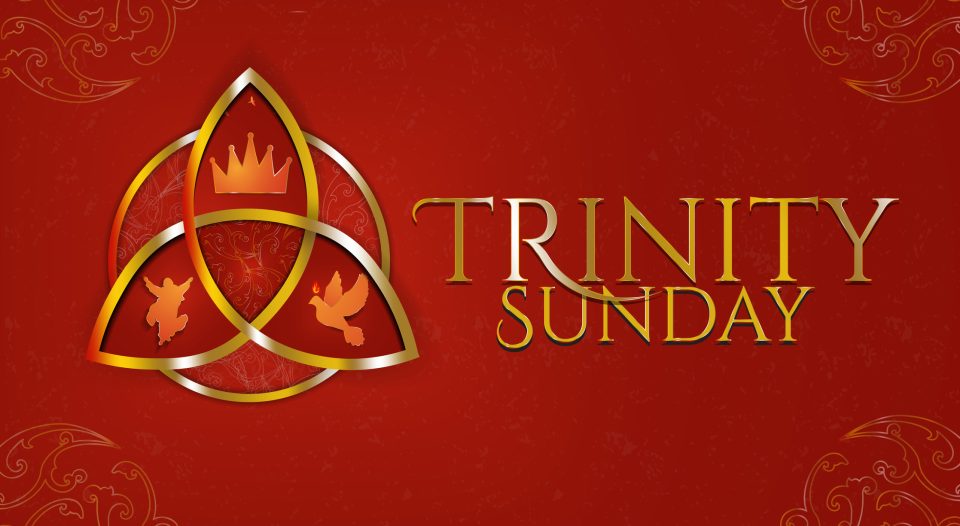Lectionary for June 15, 2025
Holy Trinity Sunday
First Sunday after Pentecost
Proverbs 8:1-4, 22-31; Psalm 8;
Romans 5:1-5; John 16:12-15
I can’t remember the first time I heard about the Spirit in church. It wasn’t during my first years of Sunday school or while listening to sermons. It must have been only in confirmation, while exploring the different ecumenical creeds, that leaders finally addressed the Spirit and her ministry (I use feminine pronouns for the Spirit advisedly, to reflect biblical precedent, in which the Hebrew word for Spirit is feminine, and the New Testament uses feminine, neuter and masculine language for the Spirit). On this day when the church is most intentional about examining God’s relationship with Godself, I’d love to set aside some time to think about the Spirit.
First, Jesus describes the coming of the Spirit and their relationship. Just as we discussed last week, God the Father and Jesus share all their words between them. So do Jesus and the Spirit (John 16:13). Just as Jesus’ words come from God so, too, do the Spirit’s words come from God and from Jesus, because all that the Father owns also belongs to Jesus (15).
Then John’s Gospel describes the economy within heaven. The Spirit will take from Jesus and give to the disciples (14). This taking is not in any way lessening or depriving Jesus. Instead of theft or borrowing, Jesus sees this “taking” as glorifying him. Imagine that! If a beloved neighbor or even a spouse takes something from us, instead of becoming angry and demanding it back, we can frame the taking as this person glorifying us because it’s so good and beautiful to give what is ours. That is the relationship of God, Jesus and the Spirit—one of complete unselfconscious giving.
This kind of unselfish relationship between Jesus and the Spirit is also what we see between God’s Wisdom (represented throughout Proverbs as a powerful and potentially aristocratic woman) and God’s Spirit in Proverbs 8. To be absolutely clear, I don’t think that Lady Wisdom is a one-to-one equivalent or a metonym for the Spirit (or for Jesus-as-logos, for that matter). But, as in any poetry like Proverbs, there are instances of borrowing images and overlapping themes. Just as Lady Wisdom plays before a creating God (Proverbs 8:30-31), the Spirit vibrates (or sometimes “hovers”) before God in creation (Genesis 1:2). Just as Wisdom speaks truth to humans (Proverbs 8:7), the Spirit speaks truth to humans (John 16:13). So, Lady Wisdom and the Spirit are not the same, but we don’t want to overemphasize their distinctions either.
This is the relationship that we see in heaven among Jesus, the Father and God’s Spirit: delighted sharing of mission and appreciation of efforts.
In the creation story of Proverbs 8, we have an example of creation ex nihilo, or out of nothing. In Genesis 1, however, the text starts with water, the Spirit moving in space over the water, a darkness that occupies space over the face of the water, and an earth that is unformed and desolate but still has existence (rather like unformed clay that isn’t yet a bowl but still exists). Where did these things come from? Genesis doesn’t say. But Lady Wisdom knows. She was there with God before the ocean (24) and before God formed even the first dust of the unformed earth (26).
Already, before the creation begins, God is filled with delight at Wisdom. Before there were even days, this workwoman of Wisdom fills God with daily delight (30). From the very beginning, before Genesis even picks up the story, God is delighted to share creative activities and prerogatives with Wisdom, because of an alignment of creativity and commitment to human flourishing and delightfulness (31). This is the relationship that we see in heaven among Jesus, the Father and God’s Spirit: delighted sharing of mission and appreciation of efforts. Returning to the John text, the intimate collaboration of Jesus and the Spirit is the context in which “taking” and “glorifying” flow from one another.
One last word. On this Sunday, many preachers will talk about perichoresis as a sort of “circle dance” of God. This image is to be avoided as it relies on an erroneous reading of the Greek root. Instead, it is more correct to think about God, Jesus and the Spirit as wrapping around each other, or mutually encircling, not in a physical sense (we’re not tritheists, after all, imagining a small pantheon of gods dancing with each other). Instead, Jesus and the Spirit—and God the Father—are wrapped up in the same business and fully devoted in the same mission: the rescue and restoration of all creation.






